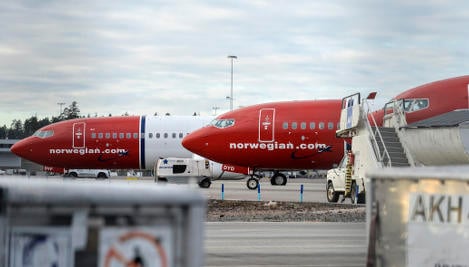NORWEGIAN
Norwegian hits unions with surprise reshuffle
Scandinavian budget airline Norwegian is transferring all its pilots in Sweden, Norway and Denmark to three new daughter companies, it announced on Thursday afternoon, as tensions grew on the sixth day of industrial action.
Published: 5 March 2015 21:24 CET

Norwegian's Boeing 737-800 fleet parked up at Stockholm Arlanda Airport. Photo: Johan Nilsson / NTB scanpix
After an extra board meeting Norwegian said it has created three new subsidiaries for its pilots in Scandinavia. The collective agreement will apply in the new firms, including the right to strike, said the airline.
"Enough is enough. More than 100,000 travellers have been affected by the pilot strike so far. Norwegian Air Norway (NAN) management has been given full power by management of the mother company to rescue the organization from this ongoing crisis," said the airline in a press release.
The unexpected news caused outrage among the unions, who saw the reorganization as an attempt at divide and rule tactics which contravened Norwegian employment legislation.
“Kjos cannot do what he has just done. As an employer, he has no authority to decide over workers while they are on strike.They are temporarily released from their employment,” Hans-Erik Skjæggerud, leader of the Parat union, told NTB newswire.
“This seems like an attempt to circumvent the entire right to strike.Kjos’s goal has been split up pilot corps in Scandinavia, and he has now tried to do by throwing them out of the NAN [Norwegian Air Norway] subsidiary and into three newly formed subsidiaries.”
Kjos’s said that the company had taken legal advice over the move and was comfortable that it was within the law.
“We have received a clear message that we are on safe ground legally,” he said.
Pilots employed by NAN want to maintain tight organizational links with the parent company in the hope of safeguarding their jobs and to standardize salary conditions for all pilots employed in the various Scandinavian subsidiaries.
Norwegian, which last year suffered its first loss in eight years, is looking to reduce the costs and benefits for pilots, and increase job flexibility.
All 700 pilots employed by NAN are on strike and 800 cabin staff have been sent home without pay in a Norwegian-imposed lockout.
Earlier on Thursday, Norwegian gave pilots’ unions NPU and Parat until 3pm to begin negotiations – but the unions did not show up.
Hans Erik Skjaeggerud, chairman of Parad, likened the deadline to a gun to the head.
“We recognize this and our members are used to it. We negotiated last night and have agreed to some changes concerning pensions and insurance. But the company gives nothing back,” he told
Norwegian broadcaster TV2.
But Norwegian CEO Bjørn Kjos told Norway’s news agency NTB: “They have been given the opportunity to negotiate even after the deadline. This is the opposite of a threat.”
More than 100,000 travellers have been hit by the strike. Practically all domestic flights in Sweden, Norway and Denmark, as well as flights within Scandinavia, have been cancelled for two days.
On Thursday passengers travelling from Sweden to other European destinations including Paris were sent text messages overnight to say that their flights would be operated by Small Planet Airlines, a budget carrier based in Lithuania and Poland.
Passengers were advised to check online before travelling to the airport.
Those who texted to say that they would be flying on Small Planet Airlines carriers were told: "The departure time, flight number and booking reference is the same. If you choose not to travel, we can offer you a full refund by contacting our Contact Centre by phone. Norwegian apologizes for the inconvenience."
Url copied to clipboard!


 Please whitelist us to continue reading.
Please whitelist us to continue reading.